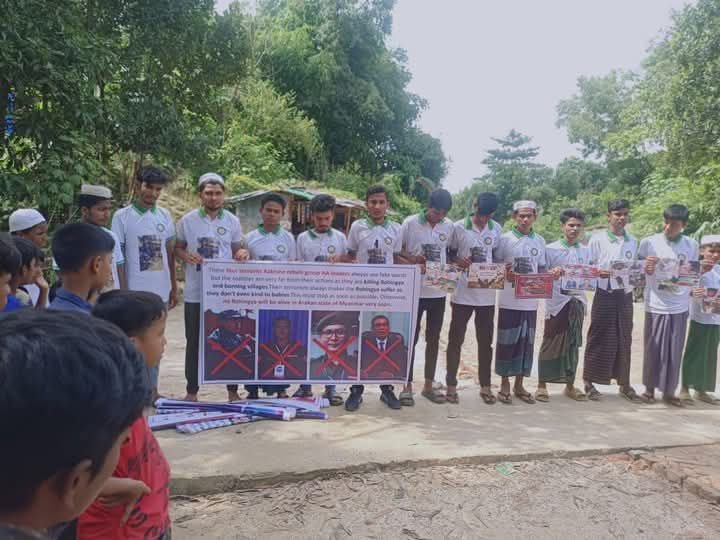The Arakan Rohingya Salvation Army (ARSA) has once again sparked outrage among the Rohingya refugee community by using young children and students for its propaganda efforts.
Reports from inside the camps indicate that ARSA members are distributing T-shirts bearing the group’s logo to children and forcing them to repeat slogans dictated by the group.
Many Rohingya, particularly those who are educated and understand the consequences of ARSA’s actions, have condemned this move, accusing ARSA of destroying their lives in Myanmar and continuing to bring misery to the refugees.
Children Used as Tools for ARSA’s Agenda
Eyewitnesses in the camps report that ARSA members have been approaching children, handing them T-shirts with the group’s emblem, and coercing them into repeating ARSA’s messages.
“They are forcing the children to say what they want them to say,” said a Rohingya activist from the camps, who asked to remain anonymous for security reasons. “The children do not understand the situation. They are being used as tools for ARSA’s agenda.”
Community members are alarmed by this tactic, as it exposes young minds to manipulation and risks turning them into symbols of ARSA’s influence.
“These are innocent students who should be focusing on their education and their future,” said another Rohingya resident.
“But ARSA is trying to make them a part of their propaganda, even though we all know ARSA has never worked for the real freedom of the Rohingya.”
A History of Destruction and Betrayal
Many Rohingya refugees in Bangladesh hold ARSA responsible for the crisis that forced them to flee Myanmar. “ARSA destroyed our lives,” said a Rohingya community leader.
“They launched attacks in Myanmar without any real strategy, provoking a brutal military crackdown that led to the deaths of thousands and forced over a million of us to become refugees.”
The group’s activities have long been controversial. While ARSA claims to fight for Rohingya rights, many believe it has only brought suffering to the community.
Recent reports suggest that ARSA has even collaborated with Myanmar’s military the same military that committed genocide against the Rohingya people in 2017.
“How can ARSA claim to represent us when they are now working with the same forces that burned our villages, killed our families, and made us refugees?” asked a Rohingya human rights activist.
Camp Residents Demand Action
The latest actions by ARSA have intensified calls for stronger measures to prevent the group from operating inside the refugee camps. Many refugees say they fear for their children’s future and want protection from ARSA’s influence.
“We fled Myanmar to escape violence and persecution,” said a refugee elder. “But now we are facing another form of oppression inside the camps.”
Camp residents are urging authorities and humanitarian organizations to take immediate steps to ensure the safety and well-being of children.
“We need education, security, and a future for our children,” said a Rohingya schoolteacher. “ARSA is only taking advantage of our situation, and we refuse to let them destroy another generation.”
With tensions rising and frustration growing, many Rohingya are demanding that international organizations and local authorities address the ARSA threat before it further destabilizes life in the refugee camps.
The community remains firm in its stance: ARSA does not represent them, and they refuse to be used as pawns in the group’s agenda.






